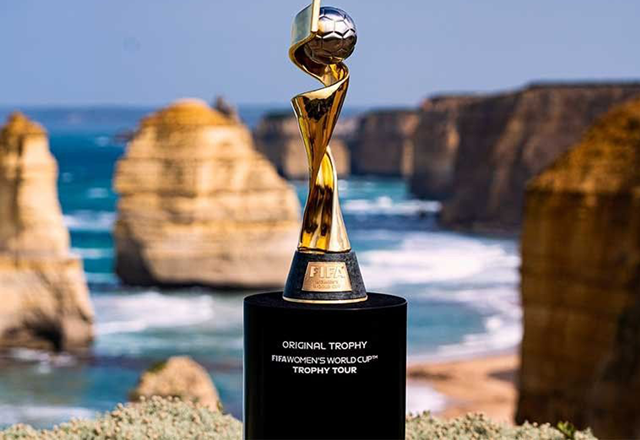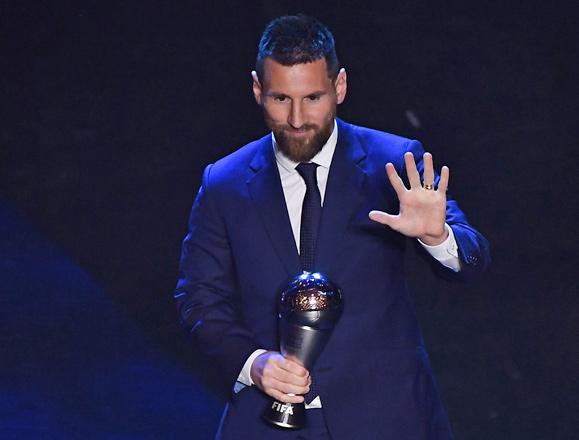You are here
World Cup starts with women’s football at all-time high
By AFP - Jul 19,2023 - Last updated at Jul 19,2023

The FIFA Women’s World Cup trophy (Photo courtesy of FIFA)
AUCKLAND — The first 32-team Women’s World Cup kicks off in Australia and New Zealand on Thursday, with the United States favourites to win an unprecedented third consecutive title in a landmark month for women’s football.
It has been a rapid expansion for a tournament that started in 1991 and featured only 16 teams as recently as 2011, then 24 in France four years ago when the USA retained the trophy.
That reflects a dramatic rise in interest in women’s football over the last decade beyond its traditional heartland of the United States, and a swarm of European sides will be aiming to snatch their title.
Australia, led by the prolific Chelsea forward Samantha Kerr, will hope to make the most of home advantage and go all the way to the final in Sydney on August 20.
This World Cup is not just bigger in terms of the number of competing nations.
FIFA has tripled the prize money compared with 2019 and the total pot, which also covers compensation for clubs releasing players, is up from $50 million four years ago to $152 million.
It is a vast hike on the $15 million offered in 2015, and confirmation that it is a boom time for women’s football.
Big crowds at club and international matches, particularly in Europe, are more evidence that the game is at an all-time high.
Nevertheless, the prize pot still pales in comparison with the $440 million dished out at the 2022 men’s World Cup in Qatar.
Meanwhile, a stand-off over the sale of broadcast rights in the biggest European countries — Germany, the UK, France, Italy and Spain — was only resolved last month.
The threat of a TV blackout was averted late in the day after FIFA President Gianni Infantino had openly criticised the amount of money being offered by broadcasters.
“FIFA is stepping up not just with words but with actions. Unfortunately, this is not the case of everyone across the industry. Broadcasters and sponsors have to do more in this respect,” Infantino said in March, adding that world football’s governing body was receiving offers amounting to just 1 per cent of what was being paid for the men’s tournament.
In Japan, a deal to avoid a blackout was only reached last week.
“It is actually terrible business if you are not tuning in,” said Megan Rapinoe, the veteran superstar of the United States team and a cultural icon who transcends the sport.
“You are missing out on a large cultural moment. This is the premier women’s sporting event in the world bar none and this is a paradigm shift globally, not just in the US.”
It will be the 38-year-old’s last World Cup after she announced she plans to retire at the end of this season.
Rapinoe was one of the USA stars who led their fight for equal pay, resulting in a landmark collective-bargaining deal last year, meaning the country’s men and women would evenly share World Cup prize money paid by FIFA.
The build-up to this tournament also saw Canada’s national team, the Olympic champions, threaten to strike in a row over pay, funding and contractual issues.
Meanwhile, France players rebelled over conditions in their national team set-up, and a change of coach followed.
That meant some of France’s top names would be at the tournament after all, having threatened to pull out, but the World Cup will still be marred by the absence of numerous leading players because of serious knee injuries.
England captain Leah Williamson and star striker Beth Mead have been ruled out, as have prolific Dutch forward Vivianne Miedema, French forwards Delphine Cascarino and Marie-Antoinette Katoto, and USA duo Catarina Macario and Mallory Swanson.
Spain’s Alexia Putellas, the reigning Ballon d’Or winner, will be there though, fit again after spending nine months out with an anterior cruciate ligament injury.
Together with Australia, European sides will be the chief threat to a US team bidding to become the first to win three Women’s World Cups in a row.
European champions England lead the charge, together with Spain, Germany, Sweden and 2019 runners-up The Netherlands.
“The expectations are really high and yes, we have a dream,” said England coach Sarina Wiegman.
England play their first game against Haiti — one of a raft of World Cup debutants — in Brisbane on July 22, while the USA begin their trophy defence the same day against another debutant in Vietnam.
Related Articles
AUCKLAND — With the opening round of group games completed, fears that a first 32-team Women’s World Cup would see a flurry of embarrassing
SYDNEY — Sunday’s World Cup final between England and Spain is the final act of a month of drama which highlighted how far women’s football
MILAN — Lionel Messi won the FIFA Men’s Player of the Year award as beaten rival Cristiano Ronaldo stayed away from the star-studded ceremon



















